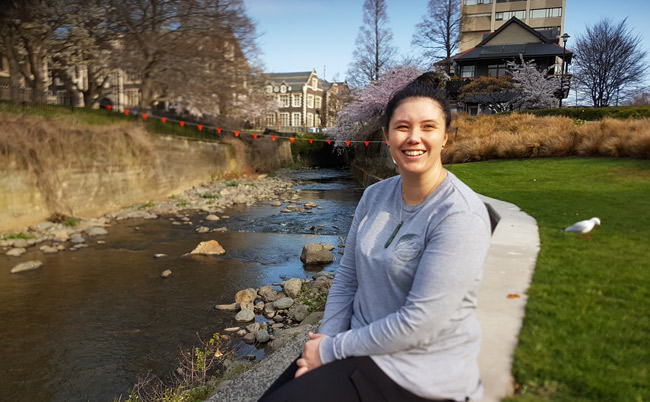Tuesday 9 October 2018 10:58am
As Te Koronga – the University’s indigenous science research theme – turns five, the Otago Bulletin Board takes a look at the novel work of one of its PhD candidates, Chelsea Cunningham.

Te Koronga PhD candidate Chelsea Cunningham and her whānau will engage with their local environment as she explores the links between environment and well-being.
Reconnecting with generations of whakapapa is no small task, but a Te Koronga PhD candidate is soon to use a novel combination of technology and physical exercise to do so.
This month, Chelsea Cunningham will head home to her whenua in Hawkes Bay to reconnect her whānau with the enviroment that’s been instrumental in shaping their lives. Her aim is to capture these stories and use them to enhance whānau well-being.
"By reconnecting to ancestral landscapes, we can create a timeline of past events and places, and also a narrative starting from the past, bringing us to the present and guiding us to the future."
“Our stories reinforce our identity and help build self worth and esteem,” Chelsea says. “I want to empower our rangatahi (youth) with their own knowledge and confidence to be proud of who they are to help them take on their own responsibilities and challenges.”
The timing of Chelsea’s field research also coincides with the fifth birthday of Te Koronga, the University’s indigenous science research theme.
Chelsea says her personal connection to the environment has helped her when dealing with times of grief.
“It is a strong healing mechanism for me and I want to share this with my wider whānau for their benefit. Understanding who you are is so important for everything, and the connection to the environment can be so precious at crucial times,” she says.
One of Chelsea’s challenges has been how to engage rangatahi in the process of reconnecting to whakapapa, and digital technologies such as virtual reality and Go pro will be used to create story maps and short videos of their engagement.
Together, Chelsea and her whānau will explore their local awa (river), maunga (mountain) and pa site on foot and by bike.
“I remember fishing in the awa with my whānau and the memories of that are so important and tied up with my sense of self and identity. By reconnecting to ancestral landscapes, we can create a timeline of past events and places, and also a narrative starting from the past, bringing us to the present and guiding us to the future.”
"Our well-being is so linked with the environment that each can benefit from the other."
The topic has been refined over nine years of tertiary study in the School of Physical Education with a specific interest in physical engagement and Māori health. Chelsea credits an early undergraduate Physical Education paper taken by Te Koronga Director Dr Anne-Marie Jackson that “gave me my own voice and made me want to keep on studying what I love”.
Te Koronga has recently received a Seeding Excellence grant from Ngā Pae o te Māramatanga (NZ’s National Māori Centre of Research Excellence) for Chelsea to further pursue her research, as well as train others in new technologies.
In the meantime, she is looking forward to reconnecting with the environment and stories from her upbringing.
“Our local awa right behind the marae is really degraded now and to help revive it I believe all we need to do is get in, use it, and reconnect with it. Our well-being is so linked with the environment that each can benefit from the other.”
